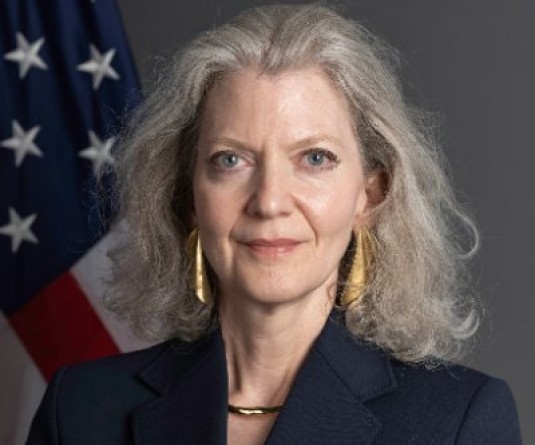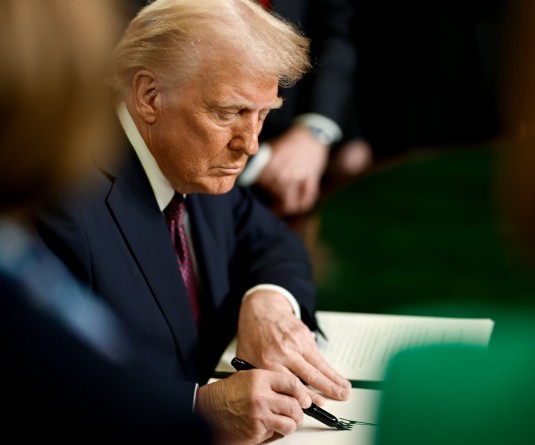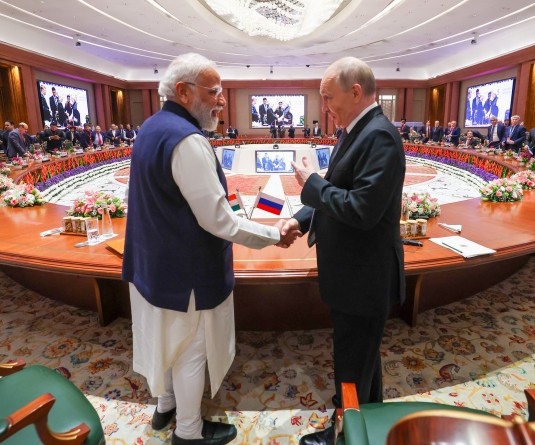
Libyan men carry a banner with a pre Gadhafi flag and reads in Arabic "February 17th revolution, we don't surrender its victory or death" as they take part in an anti Gadhafi rally and supporting France for its position in the current conflict, in Benghazi, Libya on Tuesday, April 12. Moammar Gadhafi's forces fired rockets along the eastern front line and shelled the besieged city of Misrata on Tuesday as France and Britain said NATO should be doing more to pressure the Libyan regime. (AP Photo)
DOHA, April 13 (AFP): Libyan rebels make their first appearance on a world stage on Wednesday, seeking international recognition and support for their stance that Moammar Gadhafi's departure is the only way out of Libya's crisis. On the eve of the first meeting of an international contact group, a spokesman for the rebel Transitional National Council said it will accept nothing short of the removal of Gadhafi and his sons from the country.
Mahmud Shammam, whose council is seeking international approval, stressed: "We want to move from the de facto recognition of the council to an internationally-recognised legitimacy." Such recognition would pave the way for the TNC to receive billions of dollars of desperately needed Libyan funds frozen in the United States and Britain, and the right to obtain credit at sovereign rates.
Libya's former foreign minister Mussa Kussa will be present in Doha, but rebels made it clear he would not be representing them in any way at talks ahead of the meeting. An African Union peace plan for Libya was left in tatters on Tuesday after rebels stuck to their demand that Moammar Gadhafi step down and NATO came under pressure to drop more bombs on the strongman's forces.
The Libyan opposition's Transitional National Council will address the contact group as an alternative voice for Libya's people. In London on March 29, the TNC was not permitted to attend the plenary session of an international ministerial conference on the crisis, although its envoys held bilateral talks with several world powers on the sidelines.
Since London, with Gadhafi continuing to defy NATO air strikes and with mounting calls for him to quit, the opposition council has gained support and recognition, notably from France, Italy and Qatar. The rebels were keen to distance themselves from Kussa, the former foreign minister.
"He's not connected to (the) Transitional National Council in any way or shape," media liaison official Mustafa Gheriani told AFP. The African Union peace plan looked to be dead in the water after rebels dismissed a ceasefire out of hand. Having managed to secure Gadhafi's agreement to a truce, the AU delegation encountered resistance from the rebel leadership in Benghazi, who argued that the initiative was obsolete and insisted Gadhafi be forced to quit.
In Benghazi, rebel leader Mustafa Abdul Jalil said the African initiative did not go far enough. "From the first day the demand of our people has been the ouster of Gadhafi and the fall of his regime," he said. "Gadhafi and his sons must leave immediately if they want to be safe... Any initiative that does not include the people's demand, the popular demand, essential demand, we cannot possibly recognise."
The rebels also doubted Gadhafi would adhere to a truce. "The world has seen these offers of ceasefires before and within 15 minutes (Gadhafi) starts shooting again," TNC spokesman Shamsiddin Abdulmolah said. With outgunned rebel forces making little headway in their bid to oust Gadhafi's regime, British Foreign Secretary William Hague urged NATO allies to intensify military operations in Libya.
"We must maintain and intensify our efforts in NATO, that is why the United Kingdom has in the last week supplied additional aircraft capable of striking ground targets threatening the civilian population of Libya," Hague said. "Of course it would be welcome if other countries also do the same," he said in Luxembourg before a meeting of EU foreign ministers. "There is always more to do."
Thousands of lives had been saved thanks to air strikes that were launched by Western powers on March 19. These prevented Gadhafi's forces from storming Benghazi, Libya's second largest city, three weeks ago, Hague said.
"A huge amount has been achieved in Libya but clearly there is more to be done," he continued. "Of course, to have any viable, peaceful future for Libya, Colonel Gadhafi needs to leave."
Mahmud Shammam, whose council is seeking international approval, stressed: "We want to move from the de facto recognition of the council to an internationally-recognised legitimacy." Such recognition would pave the way for the TNC to receive billions of dollars of desperately needed Libyan funds frozen in the United States and Britain, and the right to obtain credit at sovereign rates.
Libya's former foreign minister Mussa Kussa will be present in Doha, but rebels made it clear he would not be representing them in any way at talks ahead of the meeting. An African Union peace plan for Libya was left in tatters on Tuesday after rebels stuck to their demand that Moammar Gadhafi step down and NATO came under pressure to drop more bombs on the strongman's forces.
The Libyan opposition's Transitional National Council will address the contact group as an alternative voice for Libya's people. In London on March 29, the TNC was not permitted to attend the plenary session of an international ministerial conference on the crisis, although its envoys held bilateral talks with several world powers on the sidelines.
Since London, with Gadhafi continuing to defy NATO air strikes and with mounting calls for him to quit, the opposition council has gained support and recognition, notably from France, Italy and Qatar. The rebels were keen to distance themselves from Kussa, the former foreign minister.
"He's not connected to (the) Transitional National Council in any way or shape," media liaison official Mustafa Gheriani told AFP. The African Union peace plan looked to be dead in the water after rebels dismissed a ceasefire out of hand. Having managed to secure Gadhafi's agreement to a truce, the AU delegation encountered resistance from the rebel leadership in Benghazi, who argued that the initiative was obsolete and insisted Gadhafi be forced to quit.
In Benghazi, rebel leader Mustafa Abdul Jalil said the African initiative did not go far enough. "From the first day the demand of our people has been the ouster of Gadhafi and the fall of his regime," he said. "Gadhafi and his sons must leave immediately if they want to be safe... Any initiative that does not include the people's demand, the popular demand, essential demand, we cannot possibly recognise."
The rebels also doubted Gadhafi would adhere to a truce. "The world has seen these offers of ceasefires before and within 15 minutes (Gadhafi) starts shooting again," TNC spokesman Shamsiddin Abdulmolah said. With outgunned rebel forces making little headway in their bid to oust Gadhafi's regime, British Foreign Secretary William Hague urged NATO allies to intensify military operations in Libya.
"We must maintain and intensify our efforts in NATO, that is why the United Kingdom has in the last week supplied additional aircraft capable of striking ground targets threatening the civilian population of Libya," Hague said. "Of course it would be welcome if other countries also do the same," he said in Luxembourg before a meeting of EU foreign ministers. "There is always more to do."
Thousands of lives had been saved thanks to air strikes that were launched by Western powers on March 19. These prevented Gadhafi's forces from storming Benghazi, Libya's second largest city, three weeks ago, Hague said.
"A huge amount has been achieved in Libya but clearly there is more to be done," he continued. "Of course, to have any viable, peaceful future for Libya, Colonel Gadhafi needs to leave."
At least 7 dead in Yemen clashes
Sana’a, April 13 (AFP): At least seven people were killed in Yemen, including four police who clashed with a dissident Army unit, military sources and medics said on Wednesday.
"Police attacked an Army checkpoint in Amran province," 170 kilometres (105 miles) north of Sana’a late on Tuesday, "killing one officer and wounding two soldiers," a military official said. The four policemen died as security forces traded fire with automatic weapons and rocket-propelled grenades in the clash late on Tuesday, he said.
In the south of the country, soldiers on Wednesday shot dead two anti-regime protesters and wounded several others in different sectors of the port city of Aden, medics and witnesses said. They said the Army opened fire as protesters tried to set up roadblocks to enforce a general strike, which demonstrators have vowed to carry out in Aden every Saturday and Wednesday until the fall of President Ali Abdullah Saleh.
Sana’a, April 13 (AFP): At least seven people were killed in Yemen, including four police who clashed with a dissident Army unit, military sources and medics said on Wednesday.
"Police attacked an Army checkpoint in Amran province," 170 kilometres (105 miles) north of Sana’a late on Tuesday, "killing one officer and wounding two soldiers," a military official said. The four policemen died as security forces traded fire with automatic weapons and rocket-propelled grenades in the clash late on Tuesday, he said.
In the south of the country, soldiers on Wednesday shot dead two anti-regime protesters and wounded several others in different sectors of the port city of Aden, medics and witnesses said. They said the Army opened fire as protesters tried to set up roadblocks to enforce a general strike, which demonstrators have vowed to carry out in Aden every Saturday and Wednesday until the fall of President Ali Abdullah Saleh.






